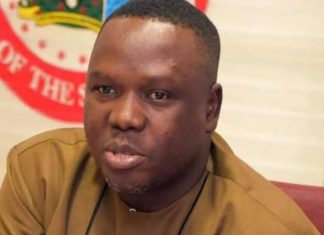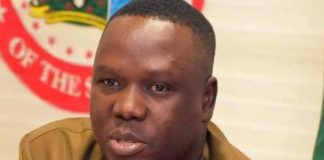By BUKAR Mohammed
Bayo Onanuga’s scathing rebuttal to Senator Ali Ndume’s concerns about lopsided appointments under President Bola Ahmed Tinubu is riddled with deflections, tokenism, and personal attacks, rather than facts and constitutional insight. In his attempt to silence genuine national concerns, Mr. Onanuga conveniently overlooks Nigeria’s foundational principle of Federal Character, as enshrined in Section 14(3) of the 1999 Constitution, which demands that the composition of the government reflects the diversity of the Nigerian state.
Let us examine the facts:
1. The North is Not a Monolith
Mr. Onanuga appears to conflate the entire North as one homogeneous bloc. The reality is that the North consists of three distinct geopolitical zones:
-
North-West (e.g. Kano, Kaduna, Sokoto)
-
North-East (e.g. Borno, Adamawa, Yobe)
-
North-Central (e.g. Kogi, Benue, Plateau)
Senator Ndume represents the North-East, a region that has long suffered underrepresentation despite contributing significantly to national stability and electoral outcomes. Onanuga’s reference to the appointment of two individuals from Borno State (Ndume’s senatorial district) into NNPC roles is not evidence of national balance. It is tokenism, not structural inclusion.
Appointments must reflect balance across zones and states, not isolated communities.
2. Tinubu’s Appointments Show a Southern, Particularly South-Western, Tilt
As of March 2025, over 70% of key national appointments under President Tinubu are drawn from the South, especially the South-West and South-South. The following key offices are illustrative:
-
Chief of Staff – Femi Gbajabiamila (South-West)
-
Minister of Finance/Coordinating Minister of the Economy – Wale Edun (South-West)
-
Minister of Interior – Olubunmi Tunji-Ojo (South-West)
-
CBN Governor – Yemi Cardoso (South-West)
-
Chairman, FIRS – Zacch Adedeji (South-West)
-
Minister of Power – Adebayo Adelabu (South-West)
-
Minister of Works – David Umahi (South-East)
-
National Security Adviser – Nuhu Ribadu (North-East – a rare exception)
Of the top 20 strategic appointments, at least 12 are from the South, disproportionately clustered around Lagos and Ogun States. This overwhelming dominance raises concerns of an overcentralization of federal power around the president’s ethnic and political base.
3. Buhari’s Appointments Were Also Lopsided – But Not to the Extent Being Branded as Over-Leaning Toward the North
It is true that President Buhari’s appointments were criticized for northern bias. Yet, let’s also examine the lopsidedness that Goodluck Jonathan (GEJ) left, which Buhari was arguably attempting to balance through his appointments:
-
CBN – South
-
FIRS – North-Central
-
NNPC – North-East
-
Customs – North-East
-
NPA – North-West
-
Maritime – South-South
We must understand that Ndume’s criticism of Tinubu is not a defense of Buhari. Rather, it is a call to avoid repeating the same imbalance, this time in reverse. The principle remains: two wrongs don’t make a right.
4. Tokenism Is Not Inclusion
Appointing two people from Borno to the NNPC board is not an achievement in national cohesion. True federal balance must be measured across all ministries, departments, and agencies, particularly in:
-
Finance
-
Security
-
Judiciary
-
Economic policy
-
Revenue generation
Appointments should not be used to pacify political allies or silence dissenters. They should be used to foster national unity and inclusion.
5. Meritocracy Must Not Undermine Federal Character
Onanuga argues that appointments are based on “merit, capacity and integrity.” But meritocracy without inclusivity in a plural federation is elitism wrapped in sectionalism. The optics of one region monopolizing key appointments, however “qualified” they may be, undermines trust in the system.
A nation as diverse and fragile as Nigeria cannot afford exclusion. Unity thrives when all regions feel seen, heard, and represented.
6. What Nigerians Expect
Nigerians expect a presidency that:
-
Unites, not alienates
-
Balances merit with inclusion, not rewards cronies
-
Upholds constitutional values, not regional loyalty
Senator Ndume’s call for fairness reflects the sentiment of many Nigerians who believe that the Tinubu administration has concentrated power and privilege in a narrow political enclave. Addressing this concern with statistics—not insults—is the responsible thing to do.
Mr. Bayo Onanuga’s emotional response does not negate the facts. Nigeria’s founding principles of federal character, unity, and inclusion cannot be set aside for regional politics or political patronage.
Rather than launching personal attacks on Senator Ali Ndume, the Presidency should reflect on the pattern of appointments and make deliberate efforts to course-correct. Token gestures cannot substitute for balanced governance.
Let it be clear:
Constructive criticism is not sabotage. Equity is not entitlement. And Nigeria belongs to all of us—not just Lagos, Daura, or Borno.
BUKAR Mohammed is a Public Analyst from Kano.
Share your story or advertise with us: Whatsapp: +2347068606071 Email: info@newspotng.com

















